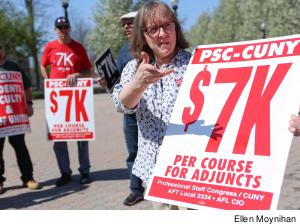Talks with CUNY ahead
PSC is back at the bargaining table with CUNY management. After two months of union pressure, CUNY management came to the table to begin negotiations. Sessions were held on March 14 and 16, another is scheduled for May 15, and the parties met in several bargaining subcommittees during April.
 |
“We are making progress,” said PSC president and chief negotiator Barbara Bowen. “At the first session the union argued forcefully for our full bargaining agenda, stressing the need for a timely contract and higher salaries, including equity increases to lower-paid full-time employees and an increase in adjunct pay to $7,000 per course.” Since those sessions, she continued, “The two sides have focused in detailed discussions in subcommittees on issues such as faculty rights in online teaching and new protections sought by the union in response to the anticipated decision in the Supreme Court Janus case.”
NO CUNY OFFER YET
At the sessions in mid-March, labor and management teams agreed upon ground rules, which include the union’s right to invite rank-and-file members to observe bargaining sessions. As of press time, CUNY management had not presented their list of demands. The PSC, though, has presented a comprehensive bargaining agenda, which was approved by the union’s Delegate Assembly in October.
In addition to demands for across-the-board raises of 5 percent per year, equity increases for lower-paid titles and $7,000 per three-credit course for adjunct instructors, the PSC is seeking provisions that strengthen job security, protect the union’s relationship with its membership, add new contractual protections for those engaged in online education and consolidate structural changes for HEOs and others achieved in the last contract.
The bargaining agenda was developed through rank-and-file working groups and in response to results from a membership survey completed by nearly 9,000 PSC members and other input from union members. Under New York state law the current contract, the 2010–2017 agreement, will remain in effect until a new agreement is reached. CUNY salaries are funded through the state and city budgets, and the union continues to press elected leaders to increase funding for CUNY so that it can meet the needs and aspirations of its students.
While no city unions have recently settled new contracts, collective bargaining is happening at the state level. The United University Professions is currently in contract talks with SUNY. In the fall of 2016, the second-largest state union, the Public Employees Federation, settled a three-year contract with annual raises of 2 percent.
MEMBER POWER
The PSC began negotiations by citing its growing strength. Since the signing of the last contract, union membership has grown – the union has a 94 percent membership rate among full-time faculty and staff. It’s this membership power – demonstrated by sustained member support, thousands of emails and messages to CUNY management, scores of members testifying and rallying, two mass civil disobediences, labor and community coalitions and 92 percent of voting members supporting strike authorization – that made the raises and the benefits achieved in the last contract possible, union officials said.
“It is important for the bargaining team to call upon the membership to engage in action in order to put pressure on CUNY,” said Lorraine Cohen, a bargaining team member and PSC vice president for community colleges. “[We need] to demonstrate our power and our desire for a fair and timely settlement.”
On May 1, PSC members at the College of Staten Island demonstrated on campus, insisting that CUNY answer the union’s demands – especially for $7K – but also joining student activists in calling for more state investment in CUNY and making CUNY tuition-free.

